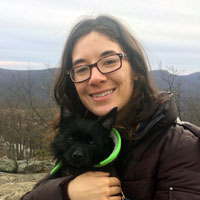Joe joined my gym when he started third grade so I pick him up after work and we bike over to Gifu Yokozeki Boxing Gym, companionable, Joe chatterboxing the whole way and throughout each session, Dada, Dada, his lungs propelling his eight-year-old voice, small, high, curious, into the ambient soundscape that includes whirring jumprope thwacks, heavy bag thuds, the quick rattling smack of the speed bag, the start and stop of the three minute timer, general shufflings and cracks and grunts, somebody yelling with every punch, somebody’s ragged panting breathing, my own. And because Yokozeki-san puts it on when Joe and I arrive there’s also the Beatles radio channel: Getting Better, I’m So Tired, Joe singing along to Strawberry Fields Forever.















 Natalie Gerich Brabson is a recent graduate of Sarah Lawrence College’s MFA program, and holds a BA in Hispanic Studies from Vassar College. Her fiction has been published in New World Writing and Eunoia Review. In 2017, she received the Go On Girl Book Club Unpublished Writer Award. She lives in Philadelphia, and is at work on her first novel.
Natalie Gerich Brabson is a recent graduate of Sarah Lawrence College’s MFA program, and holds a BA in Hispanic Studies from Vassar College. Her fiction has been published in New World Writing and Eunoia Review. In 2017, she received the Go On Girl Book Club Unpublished Writer Award. She lives in Philadelphia, and is at work on her first novel.































